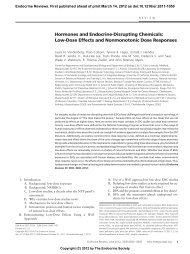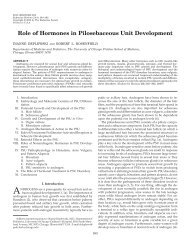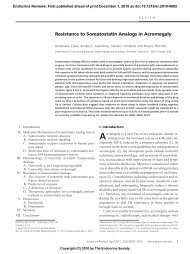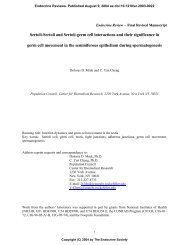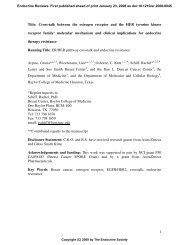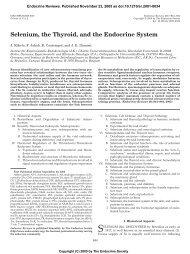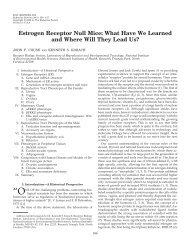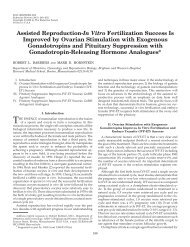1 BETA-CELL FAILURE IN DIABETES AND PRESERVATION BY ...
1 BETA-CELL FAILURE IN DIABETES AND PRESERVATION BY ...
1 BETA-CELL FAILURE IN DIABETES AND PRESERVATION BY ...
You also want an ePaper? Increase the reach of your titles
YUMPU automatically turns print PDFs into web optimized ePapers that Google loves.
42<br />
Unequivocal hypoglycemic action of GLP-1 in type 1 diabetes was demonstrated in<br />
studies of intravenous infusion of the peptide in subjects with type 1 diabetes in the<br />
hyperglycemic post-absorptive state. Under these conditions, without the administration of<br />
insulin,parenteral infusion of GLP-1 was able to reduce plasma glucose significantly and<br />
this was associated with inhibition of glucagon secretion and stimulation of residual insulin<br />
secretion, although statistically significant, was only marginal 176). However, 3 of the 11<br />
patients examined were C-peptide negative in the basal state and demonstrated no clear<br />
increment under the influence of GLP-1 (176). It was hypothesized that a major<br />
component of the glycemic effect is attributable to the known action of GLP-1 to inhibit<br />
gastric emptying and glucagon secretion (177). Studies of the effects of GLP-1R agonist,<br />
exendin-4, given together with established doses of insulin before a meal supported the<br />
hypothesis. The more prolonged actions of exendin-4 were accompanied by greater and<br />
more prolonged reduction of meal ingestion glycemic effects in volunteers with C-peptide<br />
negative type 1 diabetes receiving continuing intensive insulin therapy, demonstrating the<br />
capacity of the combination therapy to normalize blood glucose levels after ingestion of<br />
meals consistent with the dietary program of the volunteers, without apparent increased<br />
risk of hypoglycemia within a normal between-meals interval (178).<br />
Similar findings were observed with an enhancer of GLP-1(DDP-IV inhibitor:<br />
vildagliptina) in insulin-pump treated type 1 diabetic patients, inducing a significant<br />
reduction in the post-prandial glucagon in comparison with placebo. This finding provide a<br />
further evidence that the glucagonostatic effect of GLP-1 and incretin mimetics is mediated<br />
via an endocrine effect on the α-cell rather than by a paracrine effect dependent on<br />
endogenous insulin release thought to tonically restrain glucagon secretion through a local<br />
endocrine/paracrine effect (179).<br />
a) Effect of incretin (GLP-1) and incretin mimetics in β-cells<br />
1). Animal data<br />
Regarding the effect of GLP-1 on beta cells, it has been demonstrated that the acute<br />
effect is, as indicated earlier, potentiation of glucose-dependent insulin secretion (157), as<br />
also observed in healthy human subjects (180, 170), subjects with IGT (181) and patients



